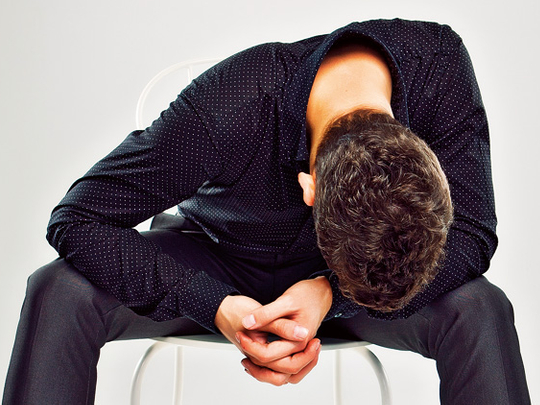
SUGAR
What it does: While sugar provides quick energy, after picking you up, it drops you hard and leaves you looking for more, says Sheeb. "Refined foods and processed simple carbohydrates - white bread, white rice, pasta, candies and table sugar - actually raise your blood-sugar levels," she says. "In turn, your body releases insulin, which triggers tryptophan and finally, after a series of events, this tryptophan is converted into serotonin." This last component is the neurotransmitter in your brain that signals the body to slow down and to "feel exhausted".
The fix: Avoid sugary, fizzy and processed drinks as well as sweetened alcoholic beverages. Choose foods that are high in fibre such as fresh fruits and vegetables and complex carbohydrates like brown rice and wholemeal breads.
TOO LITTLE EXERCISE
What it does: A lack of exercise means a lack of energy, says Sheeb. "It's a cycle - if you don't exercise, you cannot be fit, and if you're not fit, you won't have the energy to exercise," she says. Also exercise triggers the release of chemicals called endorphins into your bloodstream, which give you a feeling of happiness and positively affect your overall sense of well-being.
The fix: Make a habit of doing some form of physical fitness — be it walking, jogging, or swimming - for at least 20 minutes a day, irrespective of how tired you are.
CLUTTERED ENVIRONMENT
What it does: Clutter, whether in your head or around you, takes up space, says Jawad Sajwani, of Authenticity Coaching and Consultancy. Clutter bombards our minds with excessive stimuli, which forces our senses to work overtime and also distracts us by drawing our attention away from what we should really be focusing on.
The fix: Look at your home and identify the areas that need decluttering. Break it down into small tasks. Start small with everyday areas like your desk and build momentum towards the areas you avoid. Also divide everything into four piles: Keep, Recycle, Donate and Dump. If stuff needs to be moved out of your house, take the time to do it.
TOXIC RELATIONSHIPS
What it does: Toxicity or negativity in any relationship not only feels terrible but actually saps energy and may reduce your morale. Ultimately it triggers stress, depression, anxiety, and can even lead to medical problems.
The fix: According to therapist and author John Gottman, the four most destructive behaviours are criticism, contempt, defensiveness, and stonewalling. Replace your negative behaviour with positive behaviour. "Next, set clear boundaries — making her aware of the negative impact on you, and clearly requesting a different approach from this person can open the way to more positive behaviour," John says. "Also bear in mind that most negative behaviour is not really personal and is just a way of expressing oneself."
LACK OF WATER
What it does: "Water makes up 60 per cent of your body weight and as dehydration can cause various bodily systems to slow down, this added workload for the heart can make you sluggish, tired and irritable," says Sheeb.
The fix: How do you know if you are drinking enough water? "You should be urinating every two to four hours, and your urine should be clear or pale yellowish," says Sheeb. Make an effort to consume more soups, celery, tomatoes, melons, low-fat yogurt, broccoli, oranges, carrots and juicy fruits that are 85 to 95 per cent water. Also, make a conscious effort to drink more water.
SKIPPING MEALS
What it does: This happens to a lot of us, especially with breakfast as we are all in a rush to get to work. When you skip meals, your body's natural reaction is to slow down its metabolic rate and start saving energy as it is being depleted of nutrients. "This causes chronic fatigue syndrome and also makes blood sugar levels rise and fall."
The fix: "Eat healthy foods and kick-start your day with a nutritionally balanced breakfast," Sheeb says. "Eat more frequently but in smaller servings and consume more high-fibre fruits, vegetables, wholegrains, fish, low-fat dairy products and lean meats for steady energy levels." Aim to eat three nutritious meals a day.
CAFFEINE
What it does: While caffeine stimulates the central nervous system, this is not the same as providing energy and is, in fact, very temporary. "When you consume caffeine, your body releases cortisol, which is the fight or flight hormone in your blood that keeps you awake and alert," says dietician Sheeb Kristine Quiaonza, at Belhoul Speciality Hospital. However excess cortisol can also suppress white blood cells and increase blood pressure. "If you're already stressed and you're consuming caffeine, you're probably well on your way to adrenal fatigue."
The fix: A moderate, safe amount of caffeine is two to three cups a day. But this ‘safe' amount may vary from person to person.
Instant energy boosters
Get a Good Night's Sleep: This may not be "instant," but one good night of sleep can energise your entire day - aim for at least eight hours.
Breathe Deeply: Just taking a moment to do some deep breathing can help energise your mind and body as oxygen plays an important role in your energy levels. And belly breathing, even sitting at your desk in the office, can help inject energy.
Take a Cold Shower: A quick, cold shower can make you feel ready to face the world.
Get Outside: Aim to get out in the sunlight as early as possible because even just 15 to 20 minutes of sunlight a day can energise you.










